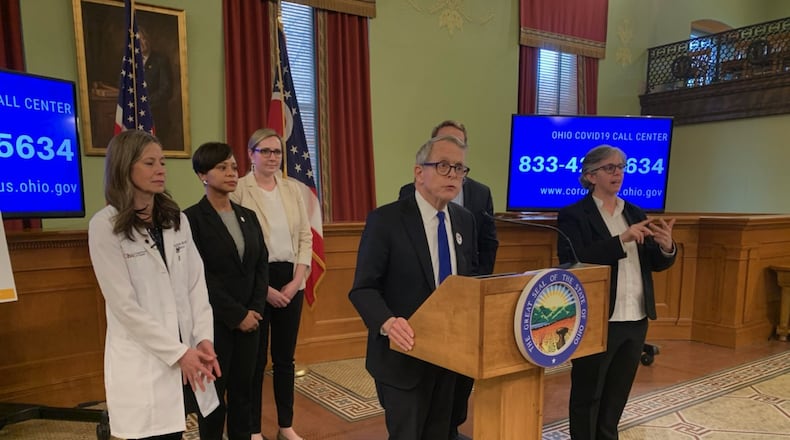>>>WATCH the live stream at this link<<<
Orders to close bars, restaurants, K-12 schools, college dorms and polling places, limit gatherings to 50 people, and prohibit visits to prisons, jails and nursing homes are designed to slow the spread of coronavirus.
If successful, Ohio will sidestep the spike in cases that could overwhelm the health care system.
“You need to know that what you’re doing is really making a difference,” said Dr. Amy Acton, director of the Ohio Department of Health.
With no interventions, it’s predicted the coronavirus could lead to 2 million deaths in the United States, she said. With interventions — social distancing to slow the infection rate — the surge on hospitals can be cut by two-thirds and the number of deaths could be reduced by half, she said.
>> Coronavirus: Dozens arrive at UD Arena as drive-up testing begins in Dayton
“There is no scenario now by which we won’t have a surge,” Acton said.
Ohio Hospital Association Chief Executive Mike Abrams said hospitals are setting up testing tents in parking lots, considering leasing out floors of hotels to accommodate patients, looking at re-opening recently closed hospitals and expanding the use of critical care hospitals.
Ohio’s 236 hospitals are currently running at 75% of capacity, he said.
DeWine said his administration is working to allow hospitals to set up on-site day care centers so that essential staff can continue working through the crisis.
Ohio issued an order that will allow for day care centers to care for children whose parents work in the health, safety and essential fields responding to coronavirus. New temporary pandemic child care centers will operate under reduced regulations focused solely on the health and safety of children.
The DeWine administration reiterated a call for dentists, veterinarians, schools, restaurants and others who have gloves, masks, nasal swabs and other equipment to turn it into local emergency management agencies.
Tamara McBride, Ohio Department of Health chief of health preparedness, said while Ohio received its equipment allotment from the national stockpile, it isn’t enough to meet the anticipated need.
The Ohio Department of Health reported Tuesday there are 67 confirmed cases of coronavirus infections. The age range of patients is 14 to 86. Seventeen are hospitalized.
DeWine on Tuesday also defended his administration’s decision to shut down Ohio’s 3,600 polling places for in-person voting in the March 17 primary.
>> PHOTOS: Polls closed over coronavirus health hazard
Acton signed a public health order late Monday to close the polls to prevent 35,000 poll workers and hundreds of thousands of voters from possibly being exposed to the coronavirus.
Lt. Gov. Jon Husted, who served eight years as Ohio Secretary of State, said other states that tried to hold primaries on Tuesday faced shortages of poll workers.
The governor said no one should have to choose between their constitutional rights and risking their health. “We felt that this would be a real, real disaster,” DeWine said.
The move came after a Franklin County judge rejected a request for a preliminary injunction to postpone in-person voting until June 2 and continue absentee voting.
“We are open for discussion about how this gets worked out,” DeWine said on Tuesday.
Ohio Senate President Larry Obhof, R-Medina, said senators would work with DeWine and Ohio Secretary of State Frank LaRose to establish a new date for the primary.
Ohio House Speaker Larry Householder, R-Glenford, took a harsher tone, saying in a memo to lawmakers, “Over the last 18 hours, unprecedented chaos and confusion have reigned over Ohio’s election system.”
He also said Acton’s “edicts” have led to confusion and challenges for Ohio’s system of government.
DeWine said the 50-person limit to gatherings won’t apply to meetings of the 99-member Ohio House.
>> Coronavirus: Complete Coverage
DeWine, Husted and Acton said none of them have been tested for COVID-19.
“There have been fantasies in my mind of a quarantine, somewhere warm,” Acton quipped. “But no, we’re working as hard as everyone else is … All of us, especially those who are in essential jobs, we’re doing our very best to stay healthy.”
Of #Ohio's #COVID19 cases:
— Governor Mike DeWine (@GovMikeDeWine) March 17, 2020
Age range: 14-86 years.
Median age 48.
Even in 40 to 50-year-olds, the fatality rate can be 1 in 250.
PREVIOUS COVERAGE:
>> Coronavirus timeline: A look at the orders changing life in Ohio
>> Coronavirus checklist: Here’s what experts say you can do to prepare for an outbreak
>> Coronavirus: List of business closures, changes because of virus concerns
>> EVENT CANCELLATIONS: What’s closed, canceled or postponed in area due to coronavirus concerns
>> Coronavirus: If you think you're sick, what should you do?
About the Author
